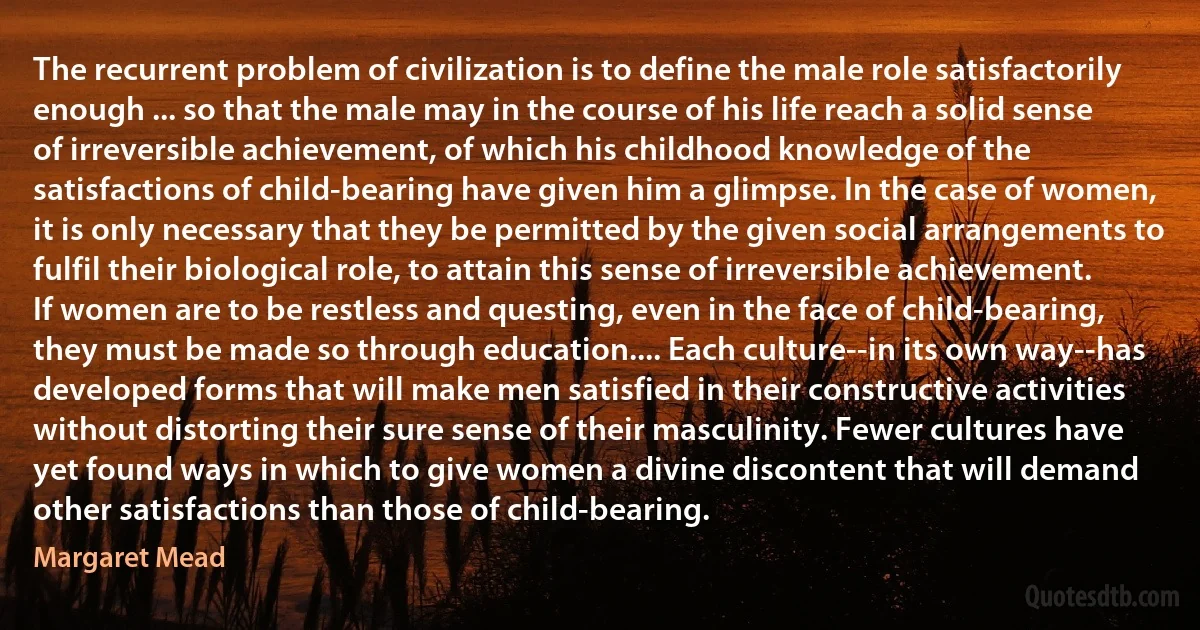
The recurrent problem of civilization is to define the male role satisfactorily enough ... so that the male may in the course of his life reach a solid sense of irreversible achievement, of which his childhood knowledge of the satisfactions of child-bearing have given him a glimpse. In the case of women, it is only necessary that they be permitted by the given social arrangements to fulfil their biological role, to attain this sense of irreversible achievement. If women are to be restless and questing, even in the face of child-bearing, they must be made so through education.... Each culture--in its own way--has developed forms that will make men satisfied in their constructive activities without distorting their sure sense of their masculinity. Fewer cultures have yet found ways in which to give women a divine discontent that will demand other satisfactions than those of child-bearing.
Margaret MeadRelated topics
biological case childhood course define divine education enough face found given glimpse women men knowledge life male masculinity necessary problem reach sense sure yet questing waysRelated quotes
I am talking about the accumulated evidence of the last 5 years that our present tax system, developed as it was, in good part, during World War II to restrain growth, exerts too heavy a drag on growth in peace time; that it siphons out of the private economy too large a share of personal and business purchasing power; that it reduces the financial incentives for personal effort, investment, and risk-taking. In short, to increase demand and lift the economy, the Federal Government's most useful role is not to rush into a program of excessive increases in public expenditures, but to expand the incentives and opportunities for private expenditures. [...] While rising demand will expand imports, new investment in more efficient productive facilities will aid exports and a new economic climate could both draw capital from abroad and keep capital here at home.

John F. Kennedy
Each of our moral, mental, and bodily powers must have its development based upon its own nature, and not based upon artificial and outside influences. Faith must be developed by exercises in believing and cannot be developed from the knowledge and understanding, only, of what is to be believed; thought must grow from thinking, for it cannot come simply from the knowledge and understanding of what is to be thought, or the laws of thought; love must be developed by loving, for it does not arise merely from a knowledge and understanding of what love is and of what ought to be loved; art, also, can only be cultivated through doing artistic work and acquiring skill, for unending discussion of art and skill will not develop them. Such a return to the true method of Nature in the method of the development of our powers necessitates the subordination of education to the knowledge of the various laws which govern those powers.

Johann Heinrich Pestalozzi
Our cause is just. Our union is perfect. Our internal resources are great, and, if necessary, foreign assistance is undoubtedly attainable. - We gratefully acknowledge, as signal instances of the Divine favour towards us, that his Providence would not permit us to be called into this severe controversy, until we were grown up to our present strength, had been previously exercised in warlike operation, and possessed of the means of defending ourselves. With hearts fortified with these animating reflections, we most solemnly, before God and the world, declare that, exerting the utmost energy of those powers, which our beneficent Creator hath graciously bestowed upon us, the arms we have been compelled by our enemies to assume, we will, in defiance of every hazard, with unabating firmness and perseverence, employ for the preservation of our liberties; being with one mind resolved to die freemen rather than to live slaves.

Thomas Jefferson
Contemplating the universe, the whole system of creation, in this point of light, we shall discover, that all that which is called natural philosophy is properly a divine study- It is the study of God through his works - It is the best study, by which we can arrive at a knowledge of the existence, and the only one by which we can gain a glimpse of his perfection.
Do we want to contemplate his power? We see it in the immensity of the Creation. Do we want to contemplate his wisdom? We see it in the unchangeable order by which the incomprehensible Whole is governed. Do we want to contemplate his munificence? We see it in the abundance with which he fills the earth. Do we want to contemplate his mercy? We see it in his not withholding that abundance even from the unthankful. In fine, do we want to know what God is? Search not written or printed books, but the Scripture called the Creation.

Thomas Paine
The issues raised in the historic conflict between Charles I, resting his claim to govern Britain on the divine right of kings, and Parliament - representing, however imperfectly, a demand for the wider sharing of power - concerned the use and abuse of state power, the right of the governed to a say in their government, and the nature of political freedom. The Levellers grew out of this conflict. They represented the aspirations of working people who suffered under the persecution of kings, landowners and the priestly class, and they spoke for those who experienced the hardships of poverty and deprivation. They developed and campaigned, first with Cromwell and then against him, for a political and constitutional settlement of the civil war which would embody principles of political freedom, anticipating by a century and a half the ideas of the American and French revolutions.

Tony Benn
